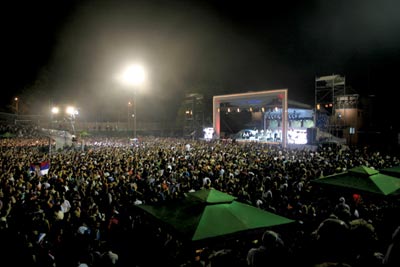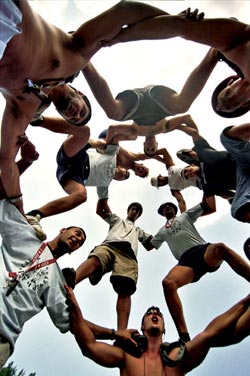Trumpet
FOR THE 47TH TIME IN GUČA: THE FOLK CARNIVAL OF SERBIAN JAZZ
Come, my darling, where you came before
Facing this year’s Dragačevo Trumpet Festival (August 8-12), the Publishing Company ”Princip Bonart Press” surprised its readers with the new, revised and redesigned edition of the book ”Guča: The Brass Soul of Serbia”. ”The strongest brand of Serbian mass culture”, ”Guča”, is not only a trumpet competition, a folk celebration, a fair or an expression of sorrow. ”Guča” is the symbol, the psychology, the music, the ethics, the humor, the irony, the energy, the dance, the passion, the ritual. Presented as a special printed movie, the book shows us how ”Guča” can be recognized through Serbia and Serbia can be recognized through ”Guča”. The long history of Serbia is recognized through the history of the trumpet, the Serbian trumpet
 Many times in life, people are not able to get the whole sense and all dimensions of what they are creating. It often happens that a work outgrows its author and goes on with its independent life, or that authors are forced to grow rapidly with their work. Many times in life, people are not able to get the whole sense and all dimensions of what they are creating. It often happens that a work outgrows its author and goes on with its independent life, or that authors are forced to grow rapidly with their work.
Long ago, in 1961, in a small town called Guča, the first Trumpet Festival of Dragačevo was organized, including four bands from nearby villages, and it was impossible for a group of enthusiasts to even dream that a couple of decades later the event would be calls ”the strongest brand of Serbian mass culture” and ”the folk carnival of Serbian jazz” and that it would be visited every summer by more than 200 thousand people, and that it would become the hero of movies and serious studies.
On Saturday, October 14, 1961, on the day of the first Great Trumpet Festival of Dragačevo (how it was called at the time), hardly anyone from all four bands could imagine that their names will be at the top of the list which is still a part of the special music history of Serbia.
In 2004, when the writing of Guča: The Brass Soul of Serbia was started, its author, the deceased Zoran Bogavac, and its heroes didn’t know that it was a fateful encounter. ”Guča” got its best author and Zoran Bogavac got one of his strangest and most provoking subjects.
THE GREAT RITUAL OF SEDUCING Despite chronic pessimists, life does give us fortunate events: such a mussed up and complex phenomenon of ”Guča” got its lucid and profound writer, the writer of the finest simplicity and of the most delicate sensibility.
Zoran Bogavac’s ”Guča” is not only a trumpet competition, a folk celebration, a fair or an expression of sorrow. ”Guča” is the symbol, the psychology, the music, the ethics, the humor, the irony, the energy, the dance, the passion, the great ritual of seducing which, just as everything else, has its painful solution. In this book ”Guča” is the wedding, the birth, the funeral, the war, the peace, the rush, the withdrawal, the huge cosmic energy release (some people think of it as a form of death).
This book speaks about soul, speaking about ”Guča”.
The brass soul of Serbia.
It shows us how ”Guča” can be recognized through Serbia and Serbia can be recognized through ”Guča”.
It gives us the long history of Serbia through the history of trumpet.
The Serbian trumpet.
In a very interesting plot, which is more than a novel, there are names and destinies of winners of Dragačevo and the names of the deceased, the names of small profiteers of history and its great losers, the names of presidents and their killers. Erotica interferes with politics, tears interfere with laughter.
Or, as wrote Branko V. Radičević (one of the ten founders of Guča): I’ve got seven wounds
So seven trumpets play
I drunk with each of them
All seven days.
Fatherland,
mark my words,
is like sweetheart's passionate love.
THE SHADOWS OF WRONG IDENTIFICATIONS  The second edition of the book Guča: The Brass Soul of Serbia is different than the first one by the order of important elements in it. The format is different, the page makeup and the design, completed with many important facts. It is not a advertising trick ― you can see all fairs, all winners, all title-holders ”Master of the trumpet”. The second edition of the book Guča: The Brass Soul of Serbia is different than the first one by the order of important elements in it. The format is different, the page makeup and the design, completed with many important facts. It is not a advertising trick ― you can see all fairs, all winners, all title-holders ”Master of the trumpet”.
The second edition of this book emphasizes the great confusion which exists between ”Guča” and the atmosphere of Kusturica’s early movies. Not because someone has something against his movies and his poetics (on the contrary!) but because they are deeply convinced that it is a wrong identification and a disservice to Kusturica and to Guča, as well. ”The essence of ’Guča’ is not the essence of Kusturica’s movies and the talented gleanings which we call Bregović’s music. ’Guča’ is not a mere oriental sorrow and not only ”a big smile and a golden tooth’. Its spirit, its nature and its essence are much different.”
Anyone who gives a closer look to this book can realize it.
The important new element of this edition is the abundance of new photographs, not only formally but essentially new, by their spirit. Among these covers we can find many interesting and original characters, urban and rural, domestic and foreign, old and young, jazz and clarinet players, town girls and girls of the folklore ensemble, beautiful women and men who don’t notice them. They don’t belong to the demimonde or banal provincialism. On the contrary, they are beautiful, clever, self-confident, they speak many languages, they have seen the world, they are on their own and they are a part of us. They are not ashamed of themselves or Serbia, nor the trumpet or the Cyrillic.
The second edition of Guča: The Brass Soul of Serbia, as a special printed movie, can be seen in two ways. The first is the text of Zoran Bogavac, lucid, gushing, inspiring, telling the past the present and the future of the phenomenon of ”Guča” through 42 short chapters and many cut up stories. The second one tell us about one day of the great finale in Guča, through photographs and glosses, from the arrival of the big parade, through the exciting competition and the well-known all night party, to the painful waking when ”the circus leaves our little town on a wide road, over a bridge...”
We should finish with the lines of Zoran Bogavac:
”... I forget how many times in the last few days ― in the uproar, in the noise, in the cheerful mob, in the fair jumble... of this big Serbian, almost Dionysian event ― I have told myself that all of that is not for me anymore (that sensual effort), and that next year, I shall go to Turkey, Greece, Spain, instead to Guča (and what shall I do there, when I am not there even if I am ― just like I am in Guča when I’m really not there?)
That is the time when I realize that it is not Serbian style to resist the call of the trumpet. When the trumpet is in command, one went to the army or went to dance a kolo. And now, one goes to Guča. The great Rumanian poet Nikita Stanesku said: ”The air in Serbia is not for breathing but for singing.”
Come, my darling, where you came before.
The National Review Press
*** Inačica
Those were the problematic years when in the state of Serbia... Everything that was Serbian was suspicious and intriguing.
The poet Branko V. Radičević, remembered the first festival which was held in the yard of the Church of Saint Archangels Michael and Gabriel:
”You should have marched through the streets of Guča, thirty five years ago, wearing anterija (a long sleeved robe) and opanci (peasant shoes) with a šajkača (a Yugoslav soldier’s hat) on your head, guarded by authorities and joined by trumpet players.”
”The drum is drumming. People are dancing a kolo. But just imagine this 35 years ago! Secretly and almost illegal. In this suspicion a kolo was prepared, seeming naïve and clumsy… Everybody must have been brave and resistant to criticizing.”
And then an invincible one, a non-stopper named all this ‘inatchica’.
His word, a poetic word, that sprung from the soil, cultivated by callous hands (even if the hands were not callous, the soul was), watered by rains, lulled to sleep by the winter frosts, fed by gibanica (living on a porridge, fat and rakija), sprung out from hard graveyard ground (because every place we walk is actually a graveyard of our ancestors). In springtime it flourished at a branch of a plum tree, in summer it danced in a kolo, in autumn it was spoken around a rakija boiler and afterwards put into the books. The Serbian prince of peasants was wise and noble. He wrote - my voice is weak. And whose voice wouldn’t be when the trumpets are playing.
”And the great national spite was born. The trumpet became a miracle. Listen to it playing. You will hear something you have never heard before… My voice is weak, I don’t have the strength to outcry the trumpet. Everything I wanted to tell you, it will be told by the trumpet.”
(From the book ”Guča: The Brass Soul of Serbia”)
*** The tale of the trumpet
The trumpet will tell you about the callous soul, years of drought, armies and wars in faraway areas, uprisings, festivals and kolos, girly laughter, the smell of bullshit, and the scent of harvested grass, human shit, nice well-springs that cure every thirst but one, the linden tree which smells beautifully at the grave above the head of a good man, black scarves, the scent of freshly milked milk, a goat bell that rattles at dusk when the cattle returns from pasture, life that is warm and tough like a cloth suit, diseases and wounds (from a painful soul and from all other things), bread and cornbread, about white shirts that are worn on the Patron Saint’s day, last year harvested wheat that has not been paid for yet, quinces that spread a nice smell from the mantelpiece, trance caused by rakija, money spent on waiters and city prostitutes, oxen that are good but not paired up, hore-frost which covers a flourishing cherry tree, rifles that announce the birth of a male newly born, eternal bestmanship and those which were betrayed, and about… and the trumpet will tell you about everything.
The peasant one, battered and mended. The one that is covered with bread and smells like wax.
(From the book ”Guča: The Brass Soul of Serbia”)
|
